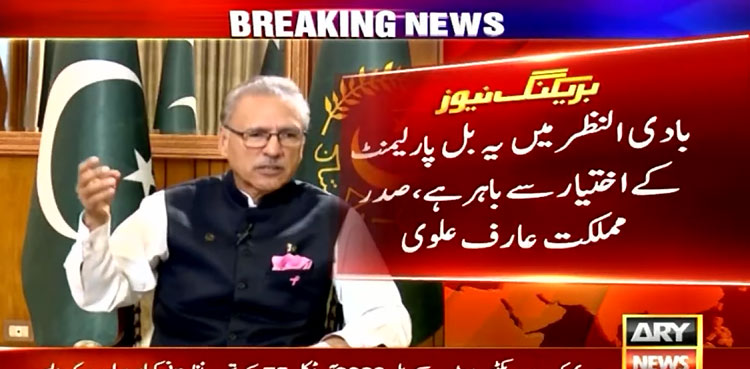
ISLAMABAD: President Arif Alvi on Saturday returned the Supreme Court (Practice and Procedure), Bill 2023 limiting the chief justice’s suo motu powers in an individual capacity, ARY News reported.
The president returned the bill for reconsideration to the parliment as per the provisions of the Article 75 of the Constitution days after it was sent to him for approval after it sailed through the National Assembly and Senate amid noisy protests by the Pakistan Tehreek-e-Insaf (PTI) legislators.
The bill was moved by Federal Law Minister Azam Nazir Tarar and adopted by a majority vote of 60-19.
Arif Alvi stated that the Bill prima-facie travels beyond the competence of the Parliament and can be assailed as colourable legislation.
The President said that he thought it fit and proper to return the Bill, in accordance with the Constitution, with the request for reconsideration in order to meet the scrutiny about its validity (if assailed in the Court of Law).
In his letter to Prime Minister Shehbaz Sharif, the president said several aspects required due consideration.
President Dr Arif Alvi has returned the Supreme Court (Practice and Procedure) Bill, 2023 for reconsideration to the Parliament as per the provisions of the Article 75 of the Constitution, stating that the Bill prima-facie travels beyond the competence of the Parliament – pic.twitter.com/SM7HXVVa5Q
— The President of Pakistan (@PresOfPakistan) April 8, 2023
Firstly, “Article 191 of the Constitution empowers the Supreme Court ‘to make rules regulating the practice and procedure of the Court’. Under such enabling provisions of the Constitution, the Supreme Court Rules 1980 have been made and in force duly validated – and adopted by the Constitution itself. These time-tested Rules are being followed ever since the year 1980 – any tinkering with the same may tantamount to interference with the internal working of the Court, its autonomy and independence,” he highlighted.
He said the Constitution was founded on the concept of trichotomy of power – three pillars of the State whose domain of power, authority and functions are defined and delineated by the Constitution itself.
Arif Alvi also cited Article 67 and Article 191 of the Constitution that defines the limits of the parliament and the Supreme Court of Pakistan.
Article 67 that states – “subject to the Constitution, a House may make rules for regulating its procedure and the conduct of its business….” while Article 191 states that “subject to the Constitution and law, the Supreme Court may make rules regulating the practice and procedure of the Court”.
The president said, “Articles 67 & 191 are akin to each other and recognize the autonomy and independence of each other respectively – barring interference of one into the other’s domain”.
President Alvi said the top court was an independent institution as visualised by the founding fathers that in the State of Pakistan ‘independence of judiciary shall be fully secured’.
“With such an objective in view, Article 191 was incorporated and the Supreme Court was kept out of the law-making authority of the Parliament,” Alvi stated.
“Article 70 relates to ‘introduction and passing of Bills’ with respect to any matter in the Federal Legislative List – enumerated in the Fourth Schedule of the Constitution. Followed and further affirmed are the provisions of Article 142(a) that Parliament can make laws ‘with respect to any matter in the Federal Legislative List’. Entry 55 of Part I of Fourth Schedule while empowering the Parliament to make laws in respect of ‘jurisdiction and powers of all courts except the Supreme Court’ especially excluded the Supreme Court,” Mr Alvi said.
Thus, the Bill prima-facie travels beyond the competence of the Parliament and can be assailed as a colourable legislation.
“The Constitution confers the Supreme Court with Appellate Jurisdiction (Articles 185 – 212), Advisory (Article 186), Review (Article 186), (Article 186) and Original Jurisdiction (Article 184). Article 184(3), the focus of the Bill relates to original jurisdiction of the Court — providing for the mode and manner for invoking it and providing Appeal. The idea may be laudable but can such a purpose be achieved without amending the provisions of relevant Articles of the Constitution — established law is that the provisions of the Constitution cannot be amended by an ordinary law as the Constitution is a higher law — father of laws — a Constitution is not an ordinary law, but rather an embodiment of fundamental principles, higher law, and law above other laws,” he highlited.
The bill
Under the new legislation, the decision for suo motu notice will be taken by three senior judges of the Supreme Court (SC).
Moreover, the bill also includes a clause regarding the right to appeal against the decision, which could be filed within 30 days and fixed for a hearing in two weeks.
It added that the party will be allowed to change its lawyer in a suo motu case. Under Article 184, the matter will be presented before a judges committee. The committee will review the case and later form a five-member committee for any kind of constitutional interpretation.
The act will be taken into effect on all verdict of the high courts and the Supreme Court (SC).
from Latest Pakistan News Breaking News from All over Pakistan - ARY News https://ift.tt/jx7oPQu

0 Comments